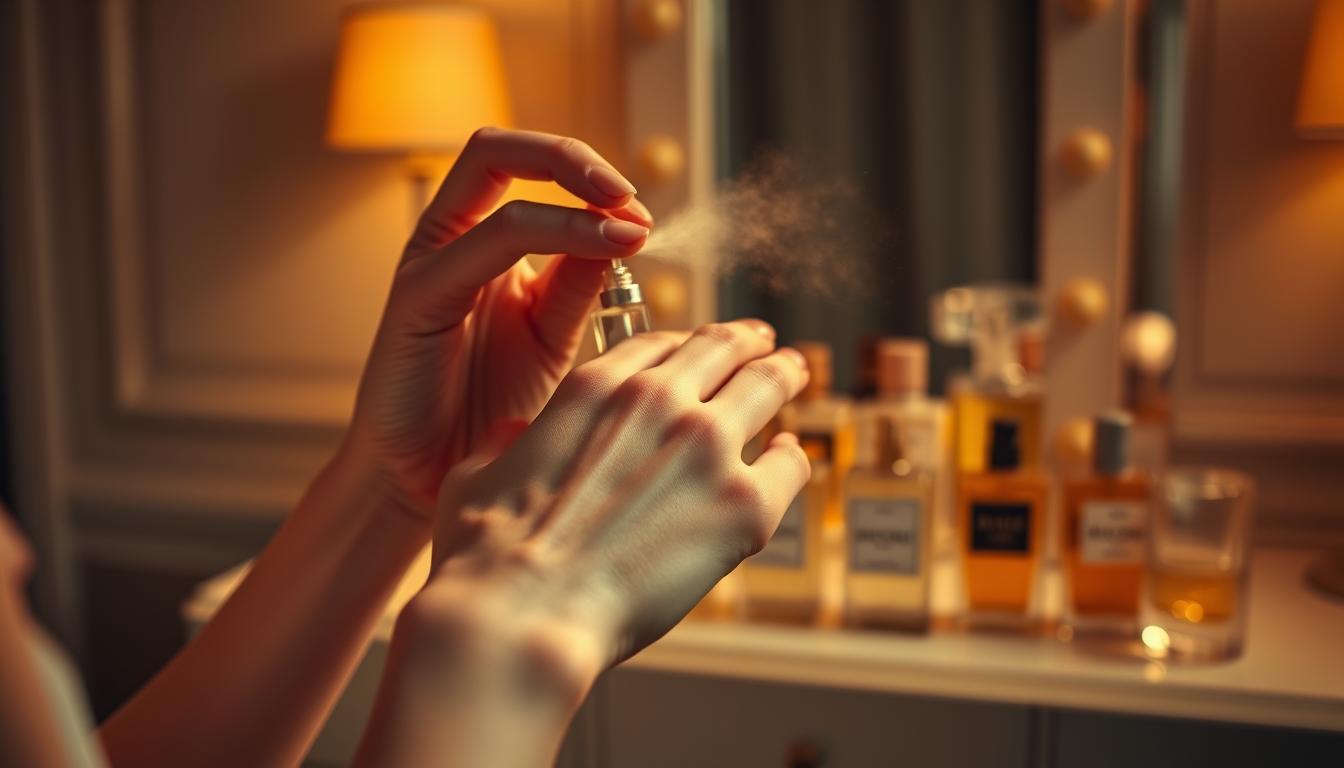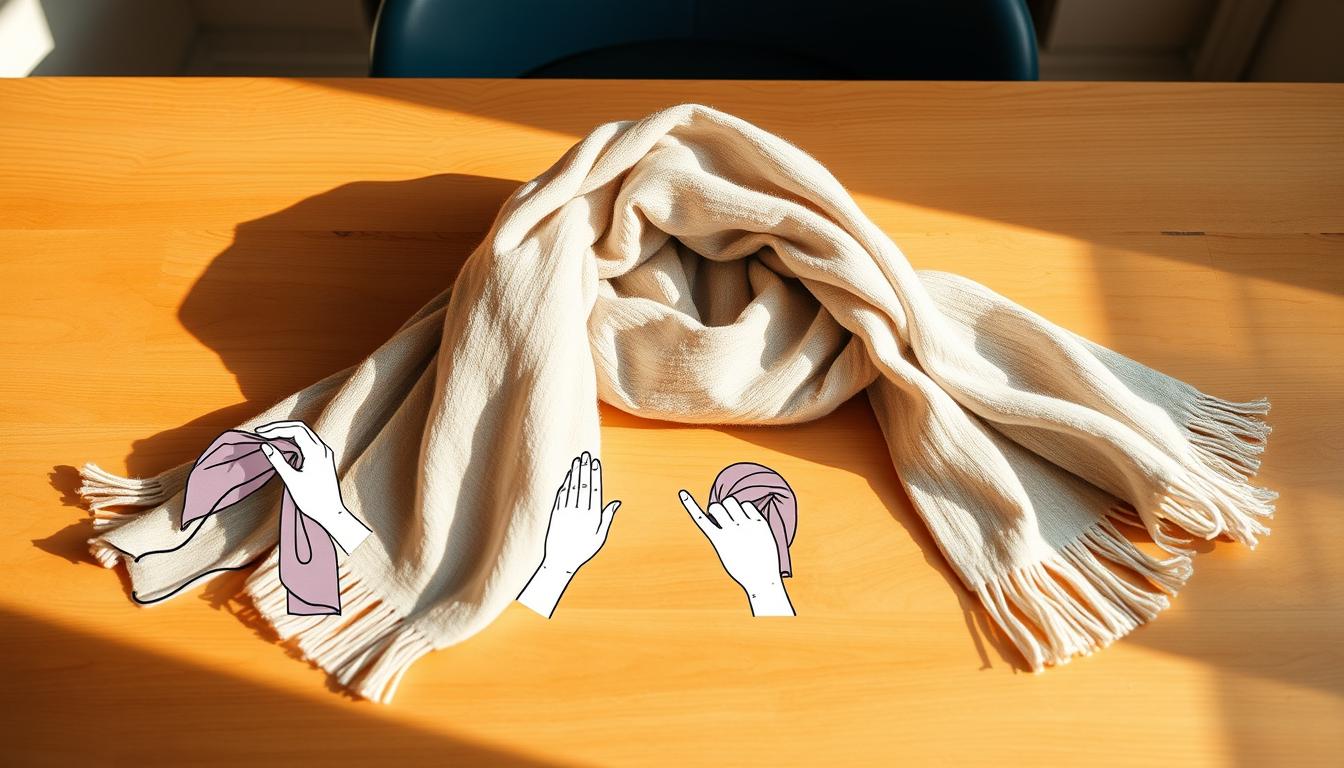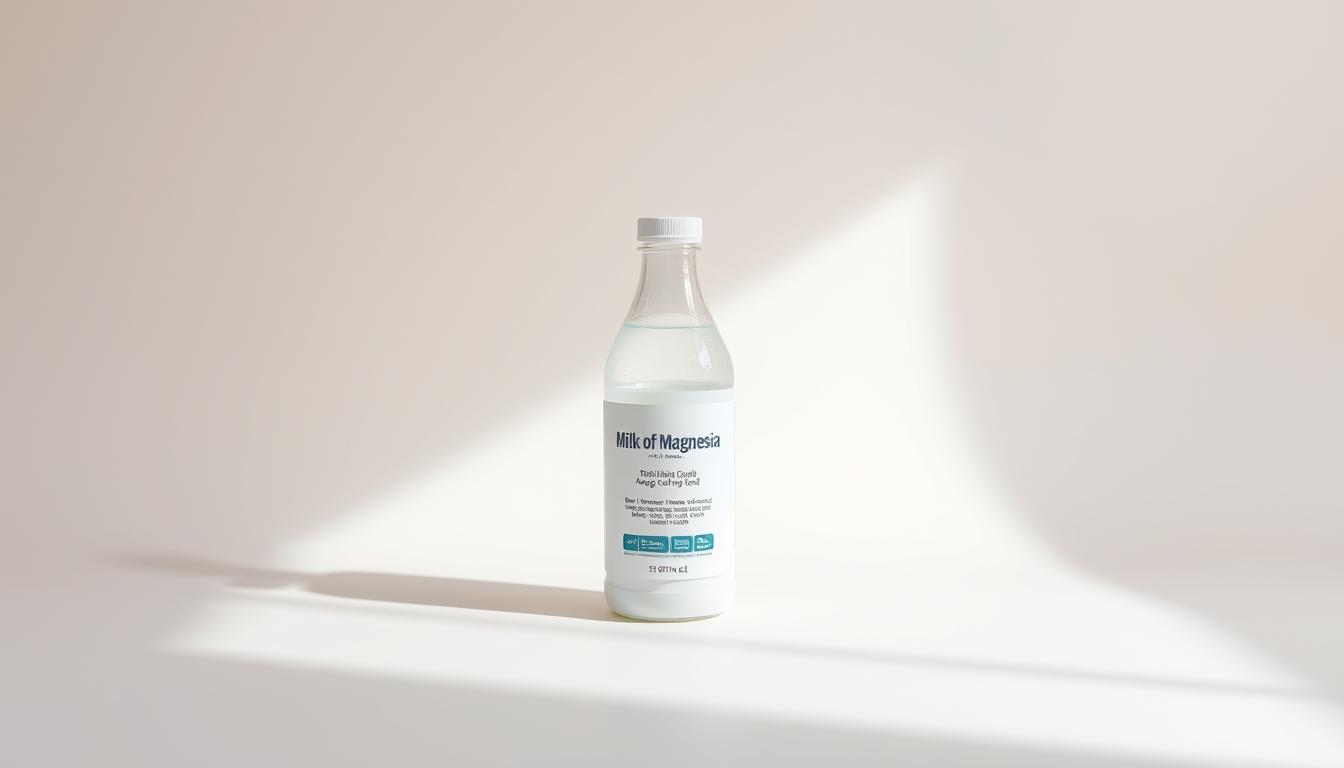Fragrance is more than a scent; it’s a personal statement. It can change how you’re seen by others. Learning to wear perfume right can make you feel more confident and stylish.
Perfume is an art that needs skill, precision, and creativity. The right way to wear it can make a simple spritz unforgettable. From picking the perfect scent to applying it just right, every step is important.
Getting into fragrances is about more than smelling good. It’s about showing who you are. Each spritz of perfume shares your mood, style, and essence. Mastering perfume application lets you express yourself in a unique way.
Key Takeaways
- Perfume is a personal statement that reflects your individual style
- Strategic application is key to making a strong fragrance impact
- Different times call for different scents
- Knowing your body chemistry helps perfume last longer
- Storing and applying perfume correctly keeps it fresh longer
Understanding the Basics of Fragrance Application
Perfume is more than just a scent. It’s an art that mixes science and personal touch. Knowing how perfume interacts with your body can change how you wear it.
Choosing the right perfume is not just about smelling it. There are key elements that make each scent unique and special.
Different Types of Fragrance Concentrations
The strength and how long a perfume lasts depend on its concentration. Here are the main types:
- Parfum (Extrait de Parfum): Highest concentration, 20-40% fragrance oils
- Eau de Parfum: 15-20% fragrance oils
- Eau de Toilette: 5-15% fragrance oils
- Eau de Cologne: 2-4% fragrance oils
The Chemistry Behind Perfume Wear
Your skin’s chemistry greatly affects how a perfume smells. Things like body temperature, pH levels, and natural oils mix with the perfume. This creates a scent that’s just for you.
| Skin Factor | Impact on Fragrance |
|---|---|
| Body Temperature | Increases scent projection and intensity |
| Skin pH | Alters how fragrance notes develop |
| Natural Oils | Helps fragrance longevity and depth |
Understanding Fragrance Notes and Layers
Perfumes have three main layers of notes:
- Top Notes: Initial impression, lightest and most volatile
- Heart Notes: Emerges after 15-30 minutes, core of the fragrance
- Base Notes: Longest-lasting, provides depth and richness
Knowing about these layers helps you enjoy the full journey of a fragrance. From the first spray to the last hint, it’s a beautiful experience.
Essential Pulse Points for Perfume Application
Learning how to apply perfume is an art. It turns a simple scent into a memorable experience. It’s not just about spraying it anywhere. It’s about knowing your body’s chemistry and picking the right spots.
Your body heats up in certain places, making fragrances stronger and spread out. These spots are perfect for perfume to bloom and last all day.
- Wrists: A classic spot for perfume, where scent meets body heat
- Neck: A warm area that helps fragrance spread well
- Behind ears: A delicate spot for a subtle yet lasting scent
- Inside elbows: A soft, warm spot for perfume to develop
- Décolletage: The chest area, keeping scent consistent
Experts say don’t rub perfume into your skin. Instead, dab or spray it gently. This keeps the scent’s true essence intact.
| Pulse Point | Heat Level | Scent Projection |
|---|---|---|
| Wrists | Moderate | Strong |
| Neck | High | Very Strong |
| Behind Ears | Low | Subtle |
| Inside Elbows | Moderate | Moderate |
| Décolletage | High | Strong |
By mastering these perfume application techniques, you’ll get the most out of your scents. They’ll enhance your natural scent and make a lasting impression.
The Art of Perfume Layering
Fragrance layering turns your scent into something special. Our guide will show you how to create a scent that’s all you. It’s a way to express your unique personality through fragrance.
Perfume lovers know layering scents is more than just mixing them. It’s a delicate art that needs understanding how different notes work together.
Combining Different Fragrances
Here are some key tips for layering fragrances:
- Choose fragrances with complementary base notes
- Start with lighter scents and add stronger ones
- Try different scent families like woody, floral, and citrus
Building a Fragrance Base
Building a strong fragrance base is key. Unscented body lotions or light moisturizers help your perfume last longer.
Matching Body Products with Perfumes
Layering fragrances gets even better when you match your body products. Pick shower gels, lotions, and oils that go well with your perfume.
- Use matching shower gel and lotion
- Apply an unscented moisturizer as a base
- Layer fragrances with similar note profiles
Layering fragrances is a journey of discovery. Trust your instincts and enjoy trying out different scents. Find the ones that make you feel confident and unique.
How to Wear Perfume for Longer Lasting Results
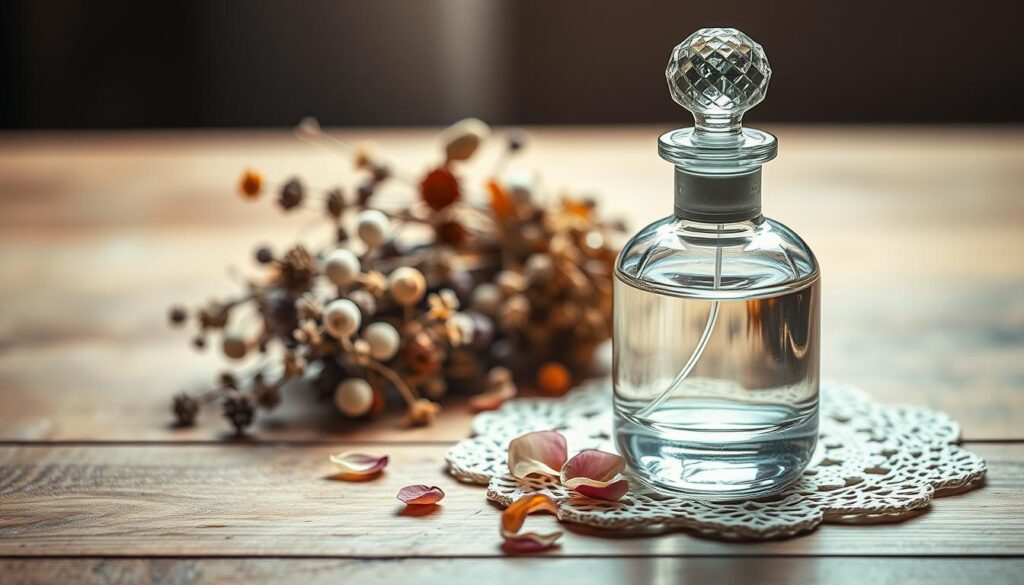
Learning how to make perfume last is an art. Our tips will help your scent stay with you from morning to night. You’ll smell great all day.
To make perfume last, start with the right skin prep. Hydrated skin is better at holding scent. Here are our best tips for lasting fragrance:
- Moisturize your skin before applying perfume
- Target pulse points for maximum scent retention
- Layer your fragrance with matching body products
- Avoid rubbing the perfume into your skin
Knowing your skin’s chemistry is important for scent longevity. Dry skin absorbs scents faster. A good moisturizer can make a big difference. Choose unscented lotions for a smooth base.
Applying perfume wisely is key. Use warm areas of your body where blood vessels are close. This helps the scent spread throughout the day. Key spots include:
- Behind the ears
- Inside of wrists
- Base of the throat
- Inside of elbows
Pro tip: Keep your perfume in a cool, dark spot. Heat and sunlight can damage the scent. This reduces its lasting power and quality.
Choosing the Right Scent for Different Occasions
Perfume is more than a smell; it’s a way to show your style and know-how about perfume etiquette. Picking the perfect scent for each event needs careful thought and a detailed approach.
Knowing how to pair your fragrance with certain places can boost your look and make a great impression.
Professional Fragrance Selection
In work settings, it’s all about being subtle. Go for light, fresh scents that keep things professional without being too much. Here are some tips for choosing scents for work:
- Opt for clean, crisp fragrances with little projection
- Stay away from strong or overpowering smells
- Look for light citrus or soft woody scents
Evening and Special Event Perfumes
For special nights, you can go bold with your scent. Evening events are perfect for deeper, more complex fragrances that grab attention and leave a lasting memory.
| Event Type | Recommended Fragrance Style |
|---|---|
| Formal Gala | Oriental and spicy fragrances |
| Romantic Dinner | Warm, sensual notes like vanilla and amber |
| Cocktail Party | Elegant floral and musky combinations |
Casual Day Perfumes
For everyday wear, pick scents that feel natural and comfy. Light, refreshing scents are best for casual days, giving a nice but subtle smell.
- Fresh aquatic fragrances
- Soft fruity notes
- Lightweight herbal compositions
Mastering the art of choosing fragrances for different occasions is key. Your perfume should match your setting, highlight your style, and show off your unique self.
Common Mistakes in Perfume Application
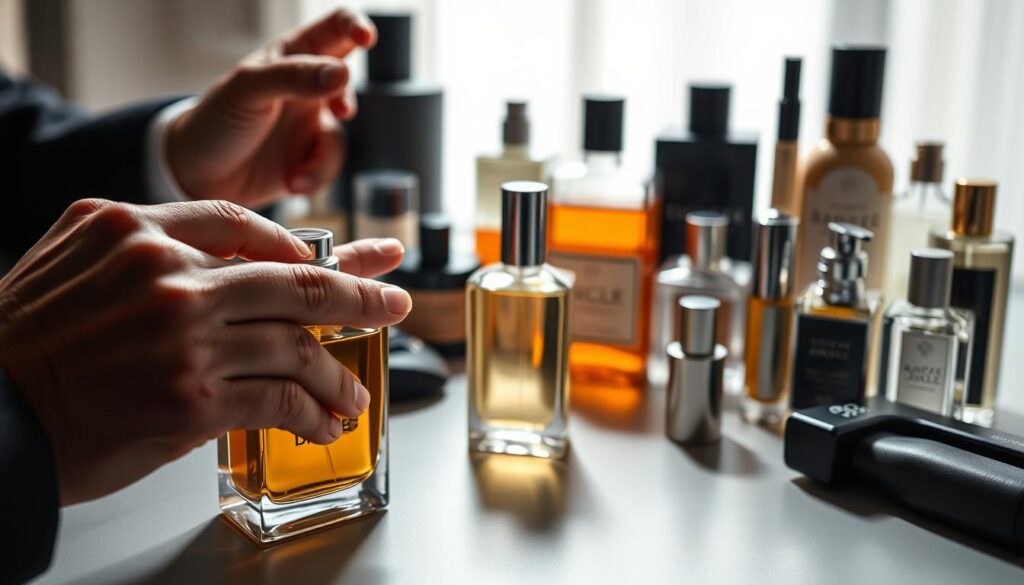
Getting the right perfume application can make a big difference. Even those who love fragrances can make mistakes. These errors can lessen the scent’s impact and how long it lasts.
Let’s look at the most common mistakes in applying perfume:
- Overspraying: Too much perfume can be overwhelming and unpleasant fast.
- Rubbing Wrists Together: This habit breaks down the perfume, changing its scent.
- Incorrect Pulse Point Application: Not all body spots are best for perfume. Use neck, wrists, and behind ears.
Perfume application is more than just how you spray it. How your skin is prepared also matters. Dry skin absorbs fragrance differently than moist skin.
Another big mistake is putting perfume on clothes. Fragrances work best with body heat and skin chemistry. Applying perfume to fabric can stain and weaken the scent.
- Always apply perfume directly to clean, hydrated skin
- Maintain a distance of 5-6 inches when spraying
- Let the fragrance settle naturally without rubbing
Knowing these tips can improve your perfume experience. You’ll enjoy a more sophisticated and lasting scent.
Seasonal Guide to Wearing Fragrances
Perfume is more than just a scent – it’s a dynamic accessory that changes with the seasons. Knowing how to wear perfume for different occasions can make your style better all year.
Our sense of smell changes with the weather. In summer, we prefer light, refreshing fragrances that match the warm weather. In winter, we need richer, more intense scents to keep us warm and add depth.
Summer Fragrance Strategies
For summer perfumes, look for these key traits:
- Citrus and aquatic notes
- Light, fresh compositions
- Alcohol-free or lighter concentrations
Winter Scent Selection
Winter fragrances need a different approach:
- Warm, spicy undertones
- Deeper woody or amber notes
- Richer, more concentrated formulas
Transitioning Between Seasons
Changing your fragrance wardrobe smoothly means understanding scent layering and matching notes.
| Season | Recommended Notes | Application Tips |
|---|---|---|
| Spring | Floral, Green | Light spritz, pulse points |
| Summer | Citrus, Marine | Minimal application, cool areas |
| Autumn | Spicy, Woody | Moderate spraying, layering |
| Winter | Vanilla, Musk | Generous application, warm areas |
Pro tip: Always test your fragrance in the new season to ensure it complements your body chemistry and the environment.
Understanding Your Body Chemistry and Perfume
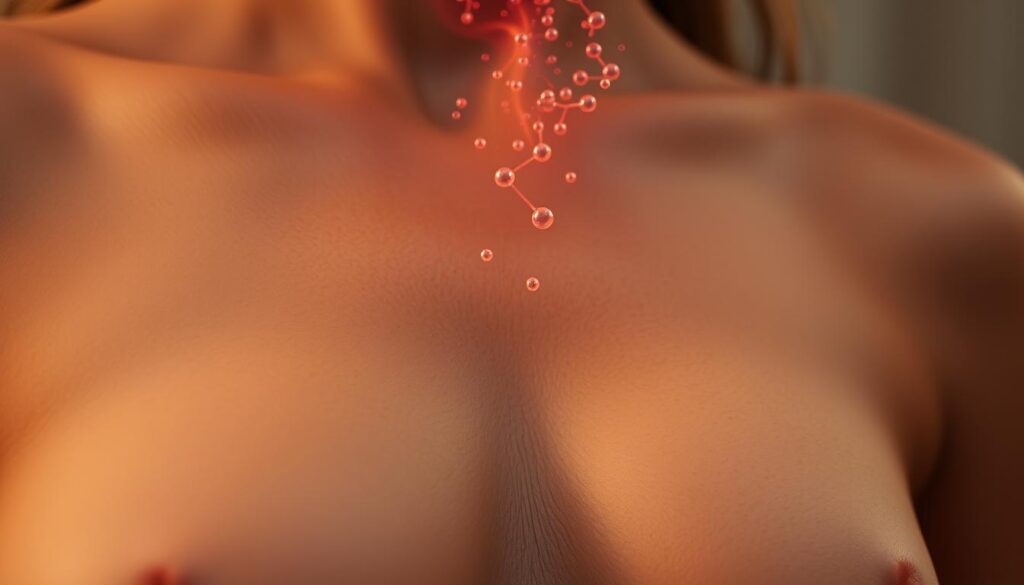
Perfume is more than just a nice smell. It’s a personal experience shaped by your body chemistry. How a fragrance smells on you is unique because of your body’s special chemistry.
Understanding your body chemistry is key. It involves several important factors:
- Skin pH levels
- Natural body temperature
- Hormonal variations
- Genetic predispositions
Your skin’s oils and chemistry make a special space for fragrances. What smells great on one person might smell different on another. This is because fragrances mix with your skin’s chemistry, making a scent just for you.
Things that affect your body chemistry include:
- Diet and nutrition
- Hydration levels
- Stress and hormonal changes
- Medications
Perfumers suggest trying fragrances on your skin and waiting 30 minutes. This lets you see how the scent works with your body. It helps you pick a perfume that feels like you.
The Role of Skin Moisture in Fragrance Longevity
Unlocking the secret to long-lasting fragrance starts with knowing how skin moisture affects it. Your skin’s hydration level is key to how your favorite scent lasts. It changes how your scent develops and stays with you all day.
Proper Skin Preparation Techniques
Getting your skin ready is the first step in making perfume last longer. Dry skin soaks up fragrance fast, making it fade quickly. To keep your scent going, follow these steps:
- Shower with lukewarm water to open skin pores
- Gently exfoliate to remove dead skin cells
- Apply an unscented moisturizer immediately after bathing
- Wait 3-5 minutes before spraying perfume
Hydration Strategies for Extended Scent Duration
The science behind keeping fragrance alive is all about keeping your skin hydrated. Well-moisturized skin acts as a shield, trapping and slowly releasing fragrance. Here are some tips for keeping your skin hydrated:
- Use fragrance-friendly moisturizers with ingredients like glycerin
- Drink plenty of water to keep your skin hydrated
- Apply petroleum jelly to pulse points before perfume for longer wear
By understanding how skin moisture and fragrance work together, you can make your perfume last longer. It goes from a quick scent to a lasting memory.
Professional Tips for Perfume Storage
Keeping your perfume collection safe is more than just picking a spot. Perfume etiquette means storing them right to keep their quality. Knowing how to store them well can make your favorite scents last longer and stay true to their original smell.
Temperature is key in keeping perfumes fresh. Too much heat or cold can damage the fragrance’s chemical makeup. This can make them less strong and change their scent.
- Avoid storing perfumes in bathrooms due to humidity and temperature fluctuations
- Keep fragrances away from direct sunlight
- Maintain a consistent room temperature between 55-72°F
- Store bottles in their original packaging when possible
It’s smart to have a special place for your perfume collection. A cool, dark cabinet or dresser drawer is ideal for perfume lovers.
| Storage Location | Preservation Quality | Recommended Duration |
|---|---|---|
| Cool, Dark Cabinet | Excellent | 3-5 Years |
| Bathroom Shelf | Poor | 6-12 Months |
| Refrigerator | Good | Up to 5 Years |
When traveling with perfumes, be extra careful. Always put bottles in padded cases. And don’t pack them in checked luggage where it’s too hot or cold. Your perfumes are valuable – treat them well.
Building Your Signature Scent Profile
Creating a unique perfume collection is more than just buying fragrances. It’s about finding your scent identity and building a collection that shows your style and personality.
Discovering Your Perfume Notes
Every perfume journey starts with understanding perfume notes. These are the scent parts that make up a fragrance. Think of them like musical notes in a song – each one is important for the whole sound.
- Identify your favorite fragrance families
- Explore different scent categories
- Understand the complexity of perfume notes
Creating a Versatile Perfume Wardrobe
A good perfume collection isn’t about how many you have. It’s about choosing wisely. Pick 3-5 core fragrances that show different sides of you.
- Everyday signature scent
- Professional work fragrance
- Evening/special occasion perfume
- Light summer fragrance
- Warm winter scent
Trying out different perfume notes helps you understand what you like. Your perfume collection should show your unique self – changing, growing, and all yours.
Proper Perfume Application Techniques
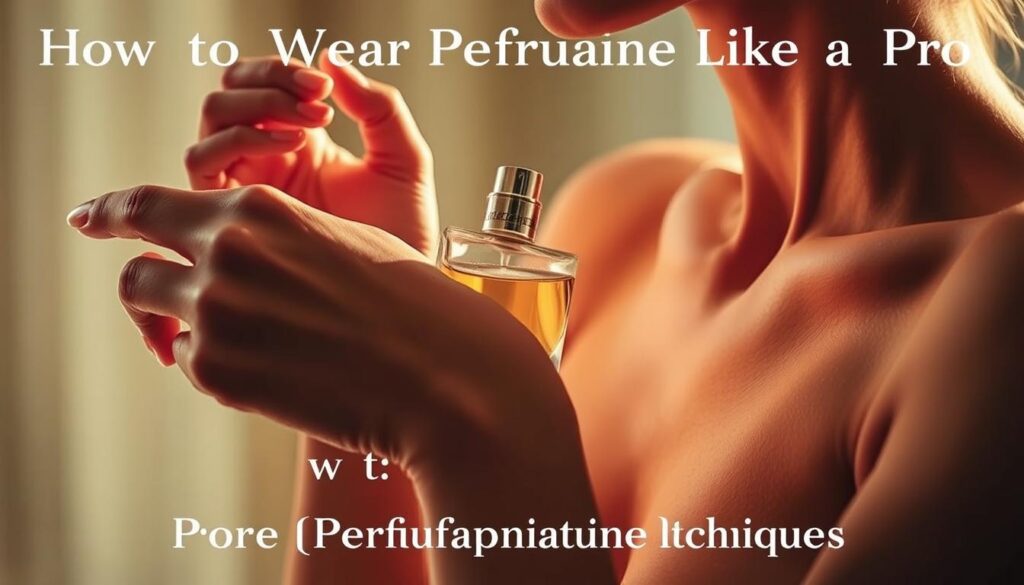
Learning how to apply perfume can make a big difference. It can turn a simple scent into something special. Knowing how to wear perfume right helps you enjoy your favorite fragrance more and look stylish.
Perfect perfume application is all about where and how you apply it. Our tips will show you how to improve your fragrance game. You’ll feel more confident and precise.
- Spray perfume on clean, moisturized skin for optimal absorption
- Target pulse points for maximum scent diffusion
- Maintain a 4-6 inch distance when spraying
- Apply 1-2 spritzes for subtle daytime wear
- Use 3-4 spritzes for evening events
Understanding your body’s chemistry is key to applying perfume well. Skin temperature and moisture levels affect how the scent spreads. Warm spots like wrists, neck, and behind ears are best for applying perfume. They help bring out the fragrance’s different notes.
Don’t rub your wrists after spraying perfume. This can change the scent. Let the perfume settle and develop on your skin naturally.
- Apply perfume before getting dressed
- Reapply sparingly throughout the day if needed
- Store fragrances in cool, dark places
Perfume application is like an art that needs practice. Try different methods to find what suits you best. It’s all about finding what works for your style and body.
Adapting Fragrance to Different Climates
Perfume lovers know that climate is key to how a fragrance smells. Knowing how temperature and humidity affect your scent is essential. It helps you learn how to wear perfume in any weather.
Different climates change how your fragrance smells. Warm weather and high humidity make scents stronger. Cold and dry air can make them seem weaker.
Navigating Humidity’s Impact on Perfume
Humidity greatly affects how fragrances smell. In hot and humid places, light fragrances with citrus or aquatic notes work best. These keep the scent fresh and prevent it from being too strong.
- Choose light, fresh fragrances for humid climates
- Opt for eau de cologne or eau de toilette concentrations
- Avoid heavy, musky scents in high humidity
Temperature Considerations for Fragrance Wear
Temperature changes how a perfume smells and lasts. Warm skin makes fragrances stronger. Cold air can make them seem less intense.
| Climate Type | Recommended Fragrance Profile | Application Tip |
|---|---|---|
| Hot & Humid | Light, Citrus, Aquatic | Apply sparingly |
| Cold & Dry | Warm, Spicy, Woody | Layer with moisturizer |
| Moderate | Versatile, Balanced | Standard application |
Pro tip: Always test your fragrance in similar climate conditions before committing to a full wear.
Mastering the Art of Scent Projection

Creating the perfect fragrance is key in perfume etiquette. Your scent should welcome others without being too much. Think of it as a personal signature – subtle yet unforgettable.
Fragrance layering is vital for controlling how strong your scent is. We’ll look at some important strategies to balance your scent:
- Start with a light base of unscented moisturizer
- Apply perfume to pulse points strategically
- Use a single spray for professional settings
- Adjust application based on fragrance concentration
Different places need different approaches to scent. In tight spaces like offices or elevators, be gentle. Less is always more in these areas.
Here are some tips for different places:
- Work environments: 1-2 subtle sprays
- Evening events: 2-3 slightly more intense applications
- Outdoor gatherings: Slightly stronger projection acceptable
Knowing your fragrance’s unique traits helps control its spread. Heavier base notes project more, while lighter top notes fade fast. Try different ways to apply to find your scent’s sweet spot.
Mastering scent projection is an art that takes practice and awareness of your space. Aim to create an interesting scent that adds to your space, not takes over.
Perfume Etiquette in Professional Settings
Understanding perfume etiquette at work is key. It’s about finding the right balance between your personal style and what’s comfortable for others. This balance is essential in a professional setting.
Choosing the right scent for work is important. Opt for something light and clean that boosts your professional look. Perfume etiquette advises picking fragrances that are subtle and won’t disturb your coworkers.
- Select fresh, light fragrances with minimal projection
- Apply perfume sparingly before entering the workplace
- Choose neutral scents that complement professional attire
- Avoid strong or exotic fragrances during work hours
Knowing when to wear certain scents is vital at work. Different places have different rules for how strong your fragrance should be. For example, tech startups might be more relaxed, while traditional offices prefer it more subdued.
Here are some tips for wearing perfume at work:
- Apply no more than 1-2 light sprays
- Target pulse points with minimal coverage
- Conduct a “colleague test” to ensure your scent isn’t overwhelming
- Be prepared to adjust your fragrance if colleagues express discomfort
Pro tip: When in doubt, err on the side of minimal fragrance. A subtle scent is always more professional than an overpowering one.
Conclusion
Learning how to wear perfume is more than just spraying a scent. We’ve delved into the world of fragrances, finding ways to make your perfume collection stand out. Every spritz has a story, and now you know how to tell yours.
Your perfume journey is all about expressing yourself. You’ve learned how to pick, apply, and keep fragrances. This knowledge lets you choose scents confidently, whether at work or at parties. Your perfume skills will make you unique.
Building a perfume collection is very personal. Each scent you choose shows a part of who you are. Don’t be afraid to try new things and let your scents grow with you. The world of fragrances is full of possibilities, and your journey is just starting.
Keep exploring new scents and learning about your body’s chemistry. Your perfume is a part of who you are, a way to show your identity without words. It’s a powerful way to express yourself.

